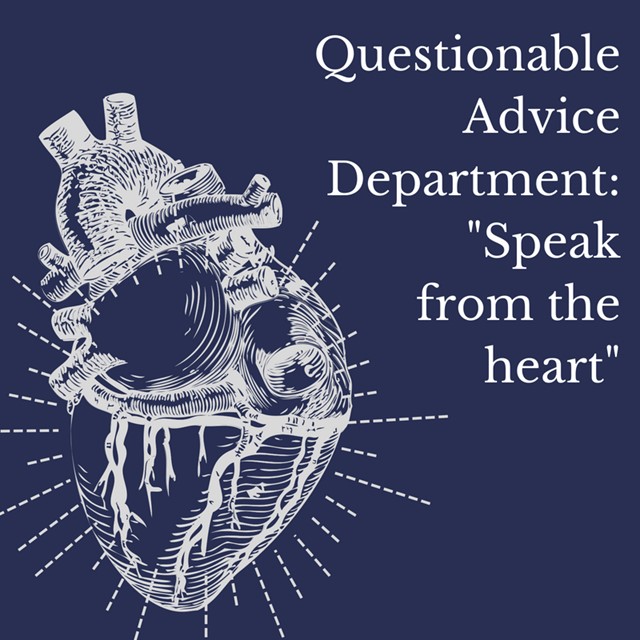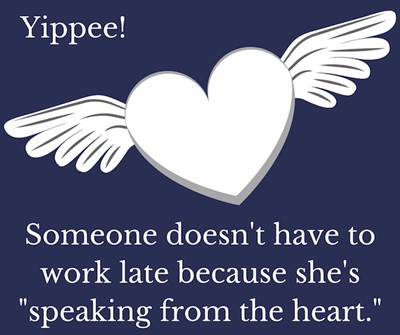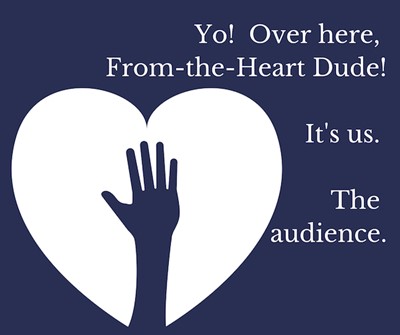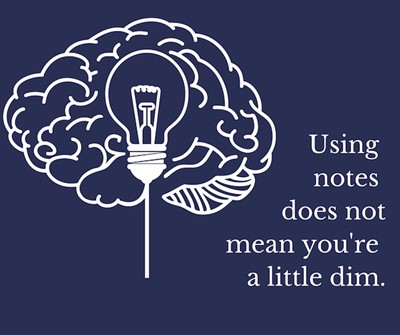
BY JENNY MAXWELL
With a fair amount of skepticism, I clicked on a tweet this week that linked me to a Fast Company article. The promise: You’ll be a better presenter if you “speak from the heart.”
Turned out the article had some solid advice. But I’m still a tad bothered by the premise (or should I say promise?) that speaking from your heart is the best approach.
"The more you can speak spontaneously, the more credible you’ll appear."
– Advice from someone who clearly has not been watching the current U.S. president speak
Of course, I get it.
The best speakers care more about their messages than they do about themselves. Their messages mean something to them.
And we want to hear from people who believe in what they’re saying and communicate it with the enthusiasm that comes from knowledge, passion, and commitment. We want to hear from speakers in their natural language. We need “authenticity.”
“Speak from the heart” should equate to all of the above. But often it doesn’t. Here’s why:
Speak from the heart=winging it
In her opening talk at our Executive Seminar, Karen Kalutz says, “When you hear a speaker say ‘I’m just going to speak from the heart,’ that’s code for we’re going to be here a long time.”
That’s because when many people decide to speak from the heart, they’re hoping to avoid or reduce prep time. Speak from the heart, to them, means open the mouth and let us experience whatever falls out.
When a knowledgeable speaker is having a good day, this can work out all right. But way too often, we in the audience wind up listening to rambling and fluff from an unprepared presenter who may or may not ever get to the salient points.

A speaker can use notes to give shape and focus to a talk. A word-for-word written text can help a speaker use the best words—and fewer of them—to make the same points.
These tools don’t have to take away from the speaker’s authenticity. Plus, there are simple delivery techniques that can minimize the presence of a script or notes.
And of course, context matters. The author of the Fast Company article chides a speaker for writing out his 60-second welcome. We might suggest writing that welcome in a conversational style, practicing it a few times, then setting notes aside and delivering the darned thing.
Because “speaking from the heart” doesn’t have to be an all-or-nothing proposition.
Just last week, I saw a young woman move an audience to tears. She was holding several notecards in her hand. She didn’t “deliver from the cards.” She spoke in a compelling, heartfelt way. She simply used the cards to keep herself on point. Nothing wrong with that.
What does your heart have to do with mine?
One of our most important missions as speakers is to show our audience what the message has to do with them: Why should the audience care?
When people speak from the heart, they often turn inward—and give a lot of information about themselves, their feelings and experiences, and why they care. The reason the rest of us should give a hooey is left for us to figure out.

One of the advantages of preparing your material is that you can get beyond yourself—really put in the work to figure out what you have to offer other people that is of value to them.
How about speaking from the head?
This brings me to a couple of issues: a) notes vs. expertise and b) the belief that emotion trumps intellect.
Let’s start with expertise. In big companies I work with, I hear this a lot: “If you really know your stuff, you should be able to talk about it without notes.”
But my experience working with brilliant minds in science, engineering, and economics shows me that experts need notes, too. Not because they don’t know their stuff. Mostly because they know TOO MUCH stuff.

Notes keep these speakers organized and serve as reminders about what to include and what to leave out.
If we think a speaker using notes signals a lack of knowledge, maybe we need to change our thinking. I, for one, would rather have accurate information presented to me from notes in an organized and logical way.
And who are we kidding—most of those horrible PowerPoint presentations are the speaker’s notes projected on the screen, anyway.
Now for that idea that emotion trumps intellect—something that “speak from the heart” can also suggest. At The Buckley School, we’re all for stories that draw the audience in, for using personal experience to help you make your point.
Most business presentations need substance, too--an appeal to the intellect combined with an appeal to the heart. People can be excited by data, facts and instruction, when that information is presented with context and with stories that show why data matters. Unfortunately for the speak-from-the-heart camp, doing that well usually requires less winging it and a little more prep.
Imagine the audience naked? Approach the lectern as if it’s a red-hot cast iron skillet? Come across some public speaking advice you question? We’d love to know about it and weigh in (even if you got the advice from us), so send us an email!






